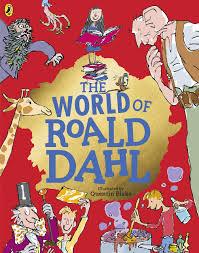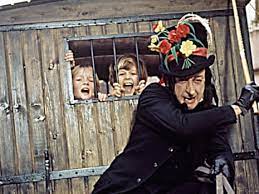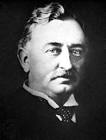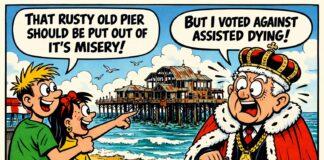- Death wish two - 2nd March 2026
- News to celebrate! - 1st March 2026
- Bombs away! - 28th February 2026

Throughout his career, for our Editor, Welshman Phil Parry exposing the fact that revered figures often have feet of clay has always been important, and now this is put centre stage by fresh information coming to light in a new book about controversial Cecil Rhodes.
It has always seemed strange to me that there is a definite view abroad that some individuals or organisations are so big and important, that you should not bring out uncomfortable facts about them.
 A case in point is Roald Dahl who has been honoured by the city of his birthplace – Cardiff.
A case in point is Roald Dahl who has been honoured by the city of his birthplace – Cardiff.
No one doubts that he was a brilliant children’s author, but is it right to honour a man who was anti-Semitic?
In a play about him, a scene set in 1983 shows him having published a review in a literary journal of God Cried, a book about the 1982 Lebanon War in which Israel invaded its northern neighbour.
In it Mr Dahl refers to Jews as “a race of people” who had “switched so rapidly from being much-pitied victims to barbarous murderers”, and he describes the US as being “so utterly dominated by the great Jewish financial institutions” that “they dare not defy” Israel.

Mr Dahl said in an interview with the New Statesman (NS): “There is a trait in the Jewish character that does provoke animosity, maybe it’s a kind of lack of generosity towards non-Jews…Hitler didn’t pick on Jews for no reason”.
Mr Dahl wrote the screenplay for the 1968 film version of Chitty Chitty Bang Bang, and one of the characters in it (the ‘Child Catcher’) was almost certainly an anti-Semitic stereotype.

The Jerusalem Post said about him: “Dahl harbored deep animus towards Israel in tandem with rabid Jew-hatred. And he was never less than forthcoming in broadcasting his racism.”.

Apparently endorsing this repugnant observation he also said to The Independent: “I’m certainly anti-Israeli and I’ve become anti-Semitic in as much as that you get a Jewish person in another country like England strongly supporting Zionism”.
Set against appalling comments like these, worries are mounting about celebrating Cardiff’s connection to Mr Dahl, with plaques on numerous buildings.
Officials have also faced awkward questions about him, after a filled in ‘holding dock’ became a pleasant walkway in the heart of Cardiff Bay, and was called Roald Dahl Plass (RDP) in his honour.
One tourist walking with his family in RDP told me: “This is a lovely place for me and the kids, but naming it Roald Dahl Plass after what he’s said, seems a bit much!”.

Another proclaimed: “I really like it down here, but I don’t like walking in a place named after this man”.
Why the abuse when you highlight these things?
Are there people simply too talented that you should just ignore the uncomfortable bits?
The spotlight has been thrown on this odd situation by new information coming to light about the controversial imperialist Cecil Rhodes in a book which has just been published called ‘THE COLONIALIST: The Vision Of Cecil Rhodes’, although the concerns about him have been raised elsewhere.


Like Mr Dahl, no one doubts Mr Rhodes’ enormous talent and drive, but there is a dark past.
His famous desire was to be able to draw a “red line” from Cairo to Cape Town, building a railway across the entire continent of Africa without ever leaving British territory.
But Mr Rhodes boosted Dutch hopes for white supremacy in Cape Colony and detractors see him as a racist.
They say he was one of the people who helped prepare the way for apartheid by working to alter laws on voting and land ownership.
In Zimbabwe, there are calls to have Mr Rhodes’s remains moved to the UK, where he was born, and in another country a statue of him was taken down.

The statue was a fixture on the steps of the University of Cape Town (UCT) but was first boarded up, then removed altogether.
He also made highly contentious comments.
“I contend that we are the first race in the world, and that the more of the world we inhabit the better it is for the human race”, he once said.
Perhaps the most famous controversy concerns rows about his statue at Oriel College, Oxford.
There were many calls to remove it but the college said “regulatory and financial challenges” prevented it, and a plaque ‘contextualising’ it was put up instead.

The plaque states the building it is on was paid for by the colonialist but that his activities “caused great loss of life”.
Critics, though, said it was not enough and declared that the sign “trivialises the pain and suffering Rhodes caused”.
So great people have done terrible things, but you should not bring them out apparently…

The memories of Phil’s decades long award-winning career in journalism (when the truth about revered individuals was always reported) as he was gripped by the rare neurological disease Hereditary Spastic Paraplegia (HSP), have been released in a major book ‘A GOOD STORY’. Order it now!
THE COLONIALIST: The Vision Of Cecil Rhodes by William Kelleher Storey is published by Oxford.
Tomorrow – final decisions are being made for the shunting together of pages by journalists on the right-of-centre Daily Express, and the left-of-centre Mirror, with the maverick Daily Star to be shacked up to the Daily Record.

But as Phil, who has worked for most of these papers explains, journalists retain loyalty to a title or programme, not a money-saving scheme dreamed up by accountants.










